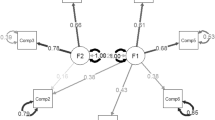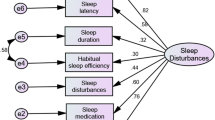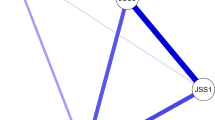Abstract
Objective
The study objective was to validate the Arabic versions of the Athens insomnia scale (AIS), Epworth Sleepiness Scale (ESS), Insomnia severity index (ISI), Medical Outcomes Sleep Scale (MOS), and Regensburg Insomnia Scale (RIS) and assess the scales’ reliability and validity among a representative sample of the Lebanese population.
Methods
A cross-sectional study, conducted between August 2017 and April 2018, enrolled 756 patients.
Results
The factor analysis for all the scales gave two loading factors for each of the AIS, ESS, ISI and RIS and three for the MOS scale. High Cronbach’s alphas were found for the Athens Insomnia Scale (0.829), Epworth Sleepiness Scale (0.822), Insomnia Severity Index (0.833), Regensburg (0.818), but moderate for the medical outcomes Sleep Scale (0.504).
Conclusion
The Arabic versions of AIS, ISI, RIS, ESS and MOS scales are reliable, practical and easy to use, and may allow clinicians to use them in clinical practice. These scales are reliable, practical and easy to use. The results presented in this study may allow Lebanese clinicians to use these validated tools to establish a screening for insomnia disorders. Further studies are needed to validate these scales in other Arabic-speaking countries.
Similar content being viewed by others
References
Cho JW, Duffy JF, Sleep, sleep disorders, and sexual dysfunction. World J Mens Health, 2018;23:43–52.
Novak M, et al. Increased utilization of health services by insomniacs–an epidemiological perspective. J Psychosom Res. 2004;56(5):527–36.
Morin CM. The nature of insomnia and the need to refine our diagnostic criteria. Psychosom Med. 2000;62(4):483–5.
Zammit GK, et al. Quality of life in people with insomnia. Sleep. 1999;22(Suppl 2):S379-85.
Irwin MR, Cole JC, Nicassio PM. Comparative meta-analysis of behavioral interventions for insomnia and their efficacy in middle-aged adults and in older adults 55 + years of age. Health Psychol. 2006;25(1):3–14.
Soldatos CR, Dikeos DG, Paparrigopoulos TJ. Athens Insomnia Scale: validation of an instrument based on ICD-10 criteria. J Psychosom Res. 2000;48(6):555–60.
Soldatos CR, Dikeos DG, Paparrigopoulos TJ. The diagnostic validity of the Athens Insomnia Scale. J Psychosom Res. 2003;55(3):263–7.
Johns M. A new method for measuring daytime sleepiness. Sleep. 1991;9:519–24.
Hays RD, Stewart AL. Sleep measures. In: Stewart AL, Ware JE, editors. Measuring functioning and well-being: The Medical Outcomes Study approach. Durham: Duke University Press, 1992. Pp. 235–259
Cronlein T, et al. Regensburg Insomnia Scale (RIS): a new short rating scale for the assessment of psychological symptoms and sleep in insomnia; study design: development and validation of a new short self-rating scale in a sample of 218 patients suffering from insomnia and 94 healthy controls. Health Qual Life Outcomes. 2013;11:65.
Morin CM, et al. The Insomnia Severity Index: psychometric indicators to detect insomnia cases and evaluate treatment response. Sleep. 2011;34(5):601–8.
Haghighi KS, et al. The Epworth Sleepiness Scale: translation and validation study of the Iranian version. Sleep Breathing. 2013;17(1):419–26.
Gómez-Benito J, Ruiz C, Guilera G. A Spanish version of the athens insomnia scale. Qual Life Res. 2011;20(6):931–7.
Bertolazi AN, et al. Portuguese-language version of the Epworth sleepiness scale: validation for use in Brazil. Jornal Brasileiro de Pneumologia. 2009;35(9):877–83.
Zagalaz-Anula N, et al. Psychometric properties of the medical outcomes study sleep scale in Spanish postmenopausal women. Menopause. 2017;24(7):824–31.
Kim M-K, et al. The reliability and validity of the Korean version of the Medical Outcomes Study-Sleep Scale in patients with obstructive sleep apnea. Sleep Med Res (SMR). 2011;2(3):89–95.
Gerber M, et al. Validation of the German version of the insomnia severity index in adolescents, young adults and adult workers: results from three cross-sectional studies. BMC Psychiatry. 2016;16:174.
Brislin RW. Research instruments. In: Field methods in cross-cultural research. 1986. 8: p. 137–164.
Johns MW. A new method for measuring daytime sleepiness: the Epworth sleepiness scale. Sleep. 1991;14(6):540–5.
Al-Abri M, et al. Validation of the arabic version of the epworth sleepiness scale in oman. Oman Med J. 2013;28(6):454.
Morin CM, Insomnia: Psychological assessment and management. New York: Guilford Press; 1993.
Buysse DJ, et al. The Pittsburgh Sleep Quality Index: a new instrument for psychiatric practice and research. Psychiatry Res. 1989;28(2):193–213.
Mollayeva T, et al. The Pittsburgh sleep quality index as a screening tool for sleep dysfunction in clinical and non-clinical samples: a systematic review and meta-analysis. Sleep Med Rev. 2016;25:52–73.
Crönlein T, et al. Regensburg Insomnia Scale (RIS): a new short rating scale for the assessment of psychological symptoms and sleep in insomnia; study design: development and validation of a new short self-rating scale in a sample of 218 patients suffering from insomnia and 94 healthy controls. Health Qual Life Outcomes. 2013;11(1):65.
Allen RP, et al. Psychometric evaluation and tests of validity of the Medical Outcomes Study 12-item Sleep Scale (MOS sleep). Sleep Med. 2009;10(5):531–9.
Okajima I, et al. Development and validation of the Japanese version of the Athens Insomnia Scale. Psychiatry Clini Neurosci. 2013;67(6):420–5.
Chiang H-L, et al. A validation study of the Chinese version of the Athens insomnia scale. 臺灣精神醫學. 2009;23(1):43–52.
Fornal-Pawłowska M, Wołyńczyk-Gmaj D, Szelenberger W. Validation of the Polish version of the Athens Insomnia Scale. Psychiatria polska. 2011;45(2):211–21.
Chen N-H, et al. Validation of a Chinese version of the Epworth sleepiness scale. Qual Life Res. 2002;11(8):817–21.
Izci B, et al. Reliability and validity studies of the Turkish version of the Epworth Sleepiness Scale. Sleep Breath. 2008;12(2):161–8.
Bloch KE, et al. German version of the Epworth sleepiness scale. Respiration. 1999;66(5):440–7.
Tsara V, et al. Greek version of the Epworth sleepiness scale. Sleep Breath. 2004;8(2):91–5.
Vignatelli L, et al. Italian version of the Epworth sleepiness scale: external validity. Neurol Sci. 2003;23(6):295–300.
Sandoval-Rincón M, et al. Validation of the Epworth sleepiness scale in Mexican population. Gaceta medica de Mexico. 2013;149(4):409–16.
Rosales-Mayor E, et al. Validation and modification of the Epworth Sleepiness Scale in Peruvian population. Sleep Breath. 2012;16(1):59–69.
Riachy M, et al. Validation of the Arabic version of the Epworth sleepiness scale: multicentre study. Revue des maladies respiratoires. 2012;29(5):697–704.
Ahmed AE, et al. Validation of the Arabic version of the Epworth Sleepiness Scale. J Epidemiol Glob Health. 2014;4(4):297–302.
Gerber M, et al. Validation of the German version of the insomnia severity index in adolescents, young adults and adult workers: results from three cross-sectional studies. BMC Psychiatry. 2016;16(1):174.
Fernandez-Mendoza J, et al. The Spanish version of the Insomnia Severity Index: a confirmatory factor analysis. Sleep Med. 2012;13(2):207–10.
Lahan V, Gupta R. Translation and validation of the insomnia severity index in hindi language. Indian J Psychol Med. 2011;33(2):172.
Yu DS. Insomnia Severity Index: psychometric properties with Chinese community-dwelling older people. J Adv Nurs. 2010;66(10):2350–9.
Chahoud M, et al. Reliability, factor analysis and internal consistency calculation of the Insomnia Severity Index (ISI) in French and in English among Lebanese adolescents. eNeurologicalSci. 2017;7:9–14.
Chung K-F, Kan KK-K, Yeung W-F. Assessing insomnia in adolescents: comparison of insomnia severity index, athens insomnia scale and sleep quality index. Sleep medicine. 2011;12(5):463–70.
Bastien CH, Vallières A, Morin CM. Validation of the Insomnia Severity Index as an outcome measure for insomnia research. Sleep Med. 2001;2(4):297–307.
Sierra J, Guillén-Serrano V, Santos-Iglesias P. Insomnia Severity Index: some indicators about its reliability and validity on an older adults sample. Revista de neurologia. 2008;47(11):566–70.
Viala-Danten M, et al. Evaluation of the reliability and validity of the Medical Outcomes Study sleep scale in patients with painful diabetic peripheral neuropathy during an international clinical trial. Health Qual Life outcomes. 2008;6(1):113.
Kim SS, et al. Validity of the medical outcomes study sleep scale in patients with painful diabetic peripheral neuropathy in Korea. J Diabetes Investig. 2013;4(4):405–9.
Lau DT, Morlock RJ, Hill CD. Psychometric evaluation of the medical outcomes study-sleep scale in persons with overactive bladder. Clin Ther. 2006;28(12):2119–32.
Funding
None.
Author information
Authors and Affiliations
Corresponding author
Ethics declarations
Conflict of interest
The authors report no conflict of interest.
Rights and permissions
About this article
Cite this article
Hallit, S., Haddad, C., Hallit, R. et al. Validation of selected sleeping disorders related scales in Arabic among the Lebanese Population. Sleep Biol. Rhythms 17, 183–189 (2019). https://doi.org/10.1007/s41105-018-0196-0
Received:
Accepted:
Published:
Issue Date:
DOI: https://doi.org/10.1007/s41105-018-0196-0




